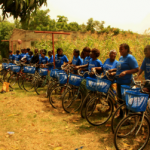We have spent a good portion of our time in Ghana visiting each of the women in their 20 different villages. We were told this couldn’t be done in 2 weeks time, as many live in remote places, but alas, it has been completed! It was very important to us to follow up with the women in this way so they could see the sincerity with which we approach this project. It allowed both them and the people of their villages to see how much we value the program and their time and effort. We held focus groups in order to understand who and what the villages are and to get a better grasp of their problems.
The past two weeks culminated with the bicycle presentation. We were told that many of their villages are large and made up of multiple communities, and now we have seen first hand that it is, in fact, very true. The bikes were given to each of the women in order to facilitate further education and referral opportunities. This small ceremony was one of the most exciting and rewarding days in Africa yet.
We started off the morning by arriving at the local bike shop at 6:30am. We rode all 20 Kekeli bikes (in three trips) over to the Sefe Clinic, the site of our ceremony. Seeing a woman riding a bike in town is not very typical, let alone a white woman- we found out later we were the talk of the town! David has taken to asking us what we can do. You ride bikes and motorcycles, swim, drive? “Oh! You people scare me!”
The guests of honor at our presentation were the director of social welfare (head of NGOs in Akatsi), a representative from the district assembly (he was a rep of the mayor and head of development in Akatsi), and a representative of the district health director. Each of us said a piece about the project, and then the representatives of health mentioned above spoke to us and the Kekeli women. The director of social welfare spoke first, and she gave a rousing speech. It was definitely a girl power moment as fists and shouts were thrown in the air in the name of women’s empowerment. The head of development in Akatsi spoke next and really hit home with his message. He focused on the fact that it takes more than government to get things done, and it needs to be a partnership, or a “collaborative”, between both the government and NGOs. He has offered to take a look at all our write-ups from the focus groups we held, with the hope that he can address some of their development problems over the next few years (toilets, water, etc.). The final representative, from the district health office, thanked us for our devotion to the Kekeli women and the Akatsi district. He also thanked all of you, our friends and family back home, for supporting the cause with your generous donations. His kindness and gratitude was so incredibly genuine.
After the bicycles and supplies (bandages, bacitracin, gloves, sugar and salt for oral rehydration solution, and condoms) had been presented the “head honchos” were excused, and the women left us with some final words. They sung a parting prayer about traveling mercies and God’s glory that left tears in our eyes.
It should be noted that they have worked so hard over the past year with no promise of compensation. They have educated over 1,000 people, referred over 40 to clinics or hospitals, and treated over 160 wounds. They find time to do these things between work, looking after children, having children, cooking, farming, and surviving. They have done all this for the good of the people around them. “Kekeli! Healthy people, healthy nation!”
-Jess


